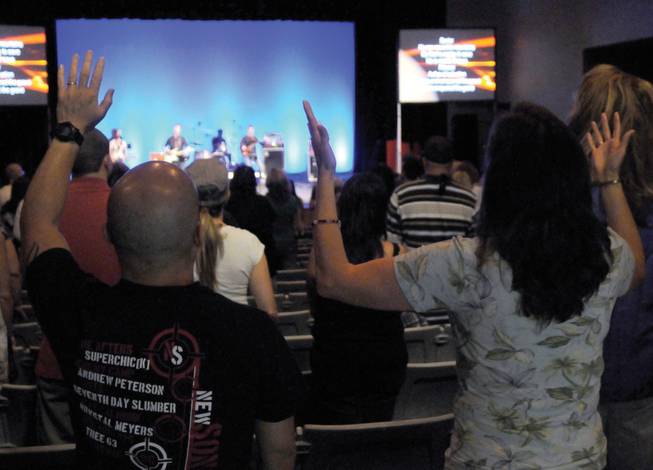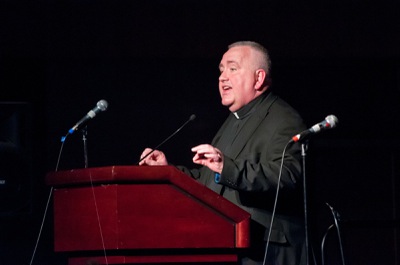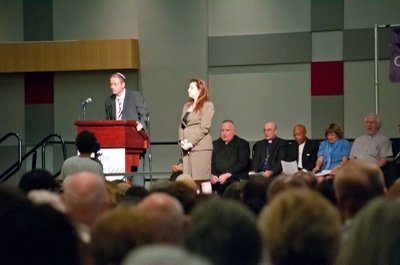
Stephen R. Sylvanie / Special to the Home News
Worshipers raise their arms in praise as a song is played by the Central Christian “Worship Team” during a 10:20 a.m. service inside Desert Oasis High School.
Sunday, Oct. 7, 2012 | 2 a.m.
Related story
Hundreds of spiritual leaders have come to Las Vegas to preach, and if their eyes weren’t already wide open to its unique personality and obvious challenges, they needed to be.
Their reasons for settling here vary, and they say finding someone with the right personality to preach here can be tricky.
Here is what some clergy say about doing God’s work in Las Vegas:
•••

Rev. Robert Stoeckig, Vice General of the Catholic Diocese of Las Vegas, addresses about 1,500 valley residents who gathered to address community and family concerns, May 22, 2012. Members of local Christian, Jewish and Muslims organizations, along with other charitable and non-profit groups, addressed issues such as children's safety, foreclosures, immigration, and education.
The Very Rev. Robert Stoeckig, vicar general, Catholic Diocese of Las Vegas
The Very Rev. Stoeckig already was living here when he decided to become a priest; he was ordained in 1996 at age 39.
“Las Vegas was mission territory because it grew up so fast and it doesn’t have the longer history and deeper roots of a place like Chicago,” he said.
Growth was the biggest challenge, he said — the uphill battle to sufficiently staff parishes with priests and to recruit still more for new parishes.
Among the Catholic clergy being recruited for Las Vegas were retirees, including chaplains who had been stationed at Nellis Air Force Base over the years, and older priests from California who appreciated Nevada’s lower cost of living.
But some priests didn’t want to stay, he said.
“Because of the nature of large parishes here, people would come for a year and see this wasn’t exactly for them because of the dynamics of size and because we have several parishes that are multilingual and need a specialized area of expertise,” he said.
•••

Rabbi Malcolm Cohen and Cantor Mariana Gindlin, from Temple Sinai of Las Vegas, make a few remarks before singing "Eili, Eili" during an interfaith gathering to address community and family concerns, May 22, 2012. Members of local Christian, Jewish and Muslims organizations, along with other charitable and non-profit groups, addressed issues such as children's safety, foreclosures, immigration, and education.
Rabbi Malcolm Cohen, Temple Sinai
The British-accented Rabbi Cohen arrived three years ago, attracted by the “huge opportunity to grow the Jewish community” by drawing in unaffiliated Jews. In his time here, the temple has more than doubled to 300 families.
“When I visited here for the job interview, I found that Summerlin looks and feels a lot like any other American suburb, so the Las Vegas part of it didn’t really enter into it,” he said.
He also was attracted to the stark, minimalist landscape of the desert, which he said reminded him of Israel.
“Living in a kibbutz looks a lot like Death Valley,” he said. “So there were really three things that drew me here: the desert, the number of unaffiliated people here and the potential for growth.”
•••
Bishop Dan Edwards, Episcopal Diocese of Nevada
Bishop Edwards, who is helping Grace in the Desert Episcopal Church find a new leader, says that a person should understand the Christian spirituality associated with the desert. He recommends a reading of “The Solace of Fierce Landscapes: Exploring Desert and Mountain Spirituality,” by Belden Lane, a theological studies professor at St. Louis University.
And the next leader had better have a complete understanding of Las Vegas, too.
“If they know us, it’s not a problem. But sometimes they worry about the whole Sin City reputation, that it’s a place of tawdry low culture and is aesthetically and morally offensive,” he said. “For people who haven’t given it a lot of thought, it takes a little educating.”
His own experience?
“I found there to be a great deal more openness, friendliness and hospitality than I would have expected,” he said. “I found the churches to have a much deeper commitment to social benevolence and acts of kindness for the poor.”
But he underestimated the challenge.
“There are a lot of people who don’t have families here and have no social support. We are separated from each other and are in despair because of the alienation,” he said. “We have double the national suicide rate. We have 1.7 times the deaths from alcoholic liver disease. There are a lot of social ills that go with loneliness and despair.
“But that’s our mission field.”
•••
The Rev. Dr. Larry Stoterau, president of the Pacific Southwest District of Lutheran Church-Missouri Synod
The challenge in recruiting pastors is overcoming the connotations that come with the Strip, Stoterau said.
“It’s a lot easier once they realize that Las Vegas has communities that are not all that different from other places in the country,” he said. “It’s certainly true that any pastor that is going to serve in Las Vegas needs to have an understanding of the gaming industry. You can’t minister in Las Vegas without becoming aware of that culture.”
The reason: Gaming can have a detrimental effect on family lives, and people get caught up in addictions and struggles brought upon by overindulgence. Some pastors view Las Vegas as a tremendous opportunity, he said, because when the population exploded in the 1980s and ’90s, it provided a vast mission field of unchurched residents.

Join the Discussion:
Check this out for a full explanation of our conversion to the LiveFyre commenting system and instructions on how to sign up for an account.
Full comments policy